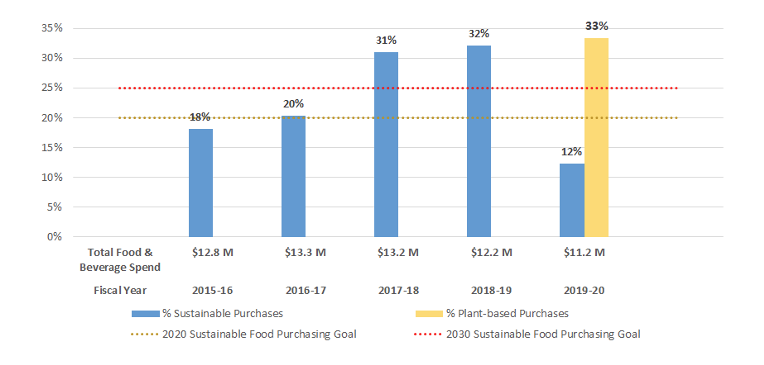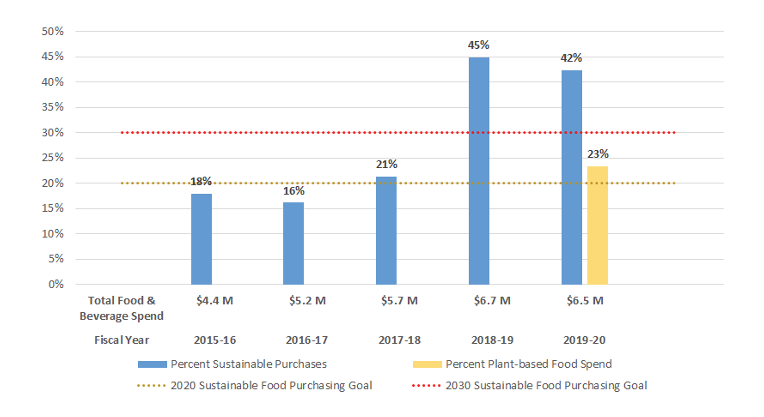Sustainable dining means that food production, transport and service have a low environmental impact.
Definition Sustainability Goals Progress Campus Actions
Sustainable dining means:
- Knowing where the food comes from and how it was produced.
- Serving seasonal, locally sourced foods that reduce transport impacts and support local agriculture.
- Offering many plant-based options, which have a considerably lower per-calorie environmental intensity than meat-based foods.
- Safe working conditions and fair wages for agriculture workers.
- Humane animal husbandry methods.
- Organic farming methods that use natural fertilizers and pest control.
- Prevention of food waste and diversion of food materials from the waste stream.
- Educating customers about more sustainable options and practices.
Sustainability Goals
- By 2030: 25% of food service spending by campus and 30% of food service spending by medical center food service operations must be for sustainable food products.
- Each campus and medical location will help support food choices by supplying patrons and foodservice staff with proper educational materials.
- Each campus and medical location will track the percentage of plant-based foods procured in order to support greenhouse gas reduction
Progress
Davis:
UC Davis met the 2020 sustainable food purchasing goal in fiscal year 2016-2017. After the sustainability criteria was revised prior to fiscal year 2019-2020, UC Davis successfully pivoted to reporting sustainable spend using the new criteria and is striving to meet the 2030 goal. Additionally, the campus measured its first set of baseline data for plant-based food spend.
UC Davis Sustainable and Plant-based Food and Beverage Spend
As of July 2021

*Sustainable food and beverage criteria changed prior to fiscal year 2019-20.
**Plant-based purchasing goal is to be determined.
Sacramento:
UC Davis Health met the 2030 sustainable food purchasing goal and reported its first set of baseline data for plant-based food purchasing in fiscal year 2019-2020.
UC Davis Health Sustainable and Plant-based Food and Beverage Spend
As of July 2021

*Plant-based purchasing goal is to be determined.
Campus Actions
-
Student Access
- Student Housing and Dining Services – Commitment to Sustainable Dining
- Food Security For Students – An increasing number of college students are going hungry due to food insecurity brought on by financial difficulties or limited access to food. Student Health and Counseling Services provides an extensive list of food resources, including free and subsidized food programs.
- Teaching Kitchen Free Cooking Classes open to all registered students and includes methods for cooking and eating sustainably.
-
Sustainable Agriculture
- Agricultural Sustainability Institute – The ASI focuses on research and education about food and agricultural sustainability. Its programs emphasize food systems that are environmentally sustainable and socially just.
-
Students for Sustainable Agriculture – This campus group is composed of graduate, undergraduate, professors and community members who support projects related to creating a socially just, ecologically balanced and economically viable food system.
-
Growing an Edible Campus
- In addition to its research and training fields and orchards, the Davis campus hosts numerous gardening programs aimed at food production in the campus landscape.
- The UC Davis Olive Center is a university/industry coalition that produces and sells oil from olives grown by UC Davis. It serves the research and education needs of California olive growers.
- The Department of Animal Science Meat Laboratory is a teaching and research lab that also provides meat products for some campus meals and sells meat to the public.
- The UC Davis Student Farm is a place where students learn sustainable growing practices in certified organic fields. They sell fruits and vegetables through campus eateries and to customers at the UC Davis Farmers Market.
- The ASUCD Community Garden is a 5-acre organic farm in Davis that rents plots to local gardeners who want to grow food and learn together.
- The Good Life Garden is an edible landscape in the courtyard of the Robert Mondavi Institute for Wine and Food Science. It was created by the UC Davis Arboretum and Public Garden in 2008 and is currently being re-envisioned with help from student interns in the Arboretum's Edible Landscaping program.
- Edible Campus is a student-led project that views the UC Davis campus as an ideal space for beautiful, educational, and edible landscapes. They maintain gardens throughout campus, including forager-friendly gardens for those who want to snap up a fresh snack on the go.
- UC Davis Farmers Market is the on-campus farmers market that takes place fall and spring quarters on the Quad next to the Memorial Union.
- Sacramento Growers Collaborative. UC Davis is a customer of this collaborative, which sells fruit and vegetables from a group of local family farms.
-
UC Davis Health is a Smart Catch Leader
- UC Davis Health's hospital cafe has twice been recognized by James Beard Foundation as a Smart Catch Leader for its efforts serve seafood fished or farmed in environmentally-responsible ways. It is the only hospital in the nation to achieve this designation two years in a row (2019 and 2020).
- UC Davis Health's hospital cafe has twice been recognized by James Beard Foundation as a Smart Catch Leader for its efforts serve seafood fished or farmed in environmentally-responsible ways. It is the only hospital in the nation to achieve this designation two years in a row (2019 and 2020).
-
Diverting Food Waste
- Food and waste have a strong intersection! And avoiding food waste can help with the challenges of food insecurity. Campus programs that aim to recover usable food, reduce food waste, and combat food insecurity include:
- Food Recovery Network
- Davis Freedges on campus (grant assistance from TGIF)
- Davis Night Market (grant assistance from TGIF)
- Food Recovery App – just a placeholder for this as OS continues to work with students, Dining Services, EH&S, and Aggie Compass/Student Affairs.
- EPA Food Recovery Challenge - Since 2012, UC Davis has participated in the U.S. EPA Food Recovery Challenge, which focuses on food organics prevention/source reduction and diversion.
-
It's not just what we eat, it's what we eat with.
- Going tray-less – All campus dining halls are now tray-less, which saves water (don’t have to wash trays) and reduces food waste (diners take fewer portions at once, resulting in less waste of uneaten food).
- Hydration stations – Stations are located throughout campus make re-filling bottles easy and prevent tons of plastic waste from disposable water bottles.
- BYO containers – Many campus retail dining establishments offer discounts to customers who bring their own food or beverage containers.

